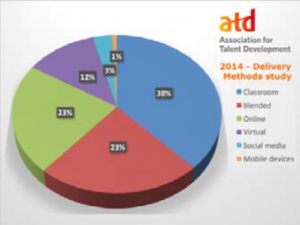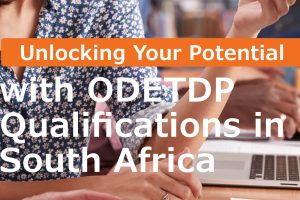Wake up to the digital revolution in education
“Universities won’t survive. The future is outside the traditional campus, outside the traditional classroom. Distance learning is coming on fast.” – Peter Drucker, 1997
It has been said that teaching and lecturing are two of the few professions that have not evolved since inception. This suggests that we could take a teacher or lecturer from an 18th century classroom and beam him or her into a 21st century classroom in most schools, colleges or universities and he would be able to teach.
But the way people communicate has changed, the type of student has changed and the syllabus has changed. Yet we are still trying to teach the same way. And it’s not working. We need a teaching and learning revolution in South Africa.
Online learning has the potential to be this revolution. Online learning is a catch-all phrase that refers to any learning delivered online, which can include e-learning, web conferencing, online lectures, blended learning, mobile learning, gamification, social learning and crowdsourced knowledge production, to mention just a few.
Online learning in South Africa is found mainly in large companies, where it is often deployed for product and compliance training. It is a quick, simple and relatively inexpensive way of training large numbers of staff. It can be deployed on the corporate network, updated in real time, tracked to make sure everyone attends and assessed to ensure everyone has learnt at least the basics. And these tests can be stored in case anyone needs to refer to them later.
Reports and surveys indicate that, internationally, online learning is quickly becoming the education revolution it promised to. The e-learning industry website shows that the various delivery methods for training in the USA in 2014 were as follows:
So the uptake of online learning is at a tipping point, having overtaken the traditional classroom. And it is growing rapidly in many countries, according to the same report, 55% growth in India, 52% in China and 26% in Brazil.
Sadly, South Africa appears to be nowhere near these figures. While it is difficult to say exactly what the growth rate here is, a recent study by Ambient Insight, the Africa market for self-paced e-learning products and services: 2011-2016 forecast and analysis, estimated that the overall growth rate in self-paced e-learning in Africa is 15.2%. In the report, South Africa was not one of the top four African countries where growth was taking place (in fact, number one on the continent in terms of growth is Senegal, at 30.4%, followed by Zambia, Zimbabwe and Kenya, at 27.9%, 25.1% and 24.9% respectively).

But what about e-learning opportunities for the South African who is not employed by a big corporate with access to data and a PC or other device? One of biggest hurdles to widely available e-learning for South Africans has been access to cheap and stable bandwidth. This is now becoming more available, as cities such as Cape Town, Pretoria and Johannesburg roll out free wifi in public spaces. Similar plans are being made for rural South Africa.
- Online learning has huge potential in South Africa because it can:
- Provide relatively inexpensive education and training to people who cannot afford to travel;
- Allow people to repeat modules as often as they need to – this is especially beneficial for those studying in a language other than their home language;
- Personalise the learning journey, allowing learners to cover the material they need when they need it and move around in the course in a non-linear fashion;
- Be quickly updated if facts change (far more quickly than a textbook);
- Be interactive, engaging and fun (which a classroom can be as well if the facilitator is good);
- Be quickly translated into other languages;
- Be supplemented with additional resources on demand, and
- Provide an eco-friendly training solution
It is clear that demand for tertiary education in South Africa has exceeded supply and that one of the ways of satisfying the seemingly insatiable demand cost effectively is through online learning. Online learning in South Africa’s formal educational and training sector can bring about the following benefits:
- inexpensive first-year bridging training to assist those who are disadvantaged by the schooling system prior to entering university (a reduced-subject first year can be offered along with intense tutoring on academic literacy, mathematics, research skills, reading comprehension and study skills);
- inexpensive full-time study option for students who cannot travel to brick-and-mortar campuses.
- workplace readiness skills for new graduates who have not yet been placed, along with a portal for placement opportunities once they complete the online readiness training; • it can provide students with the skills they need to take part in the knowledge economy of the 21st century, and
- key subjects, where there are fewer skilled teachers, can be taught partially online so that every student gets the benefit of an excellent teacher. There are pockets of excellence in online learning practice in South Africa and the swing in favour of making it work is starting to gain momentum. But if it is to make the impact that it could make we need the following bold steps:
- a coordinated and committed effort from all institutional stakeholders to support (and actively promote) online learning.
- cooperation among providers of online learning (similar to Creative Commons and many of the USA massive open online courses – MOOCs), where different providers contribute intellectual property to a shared space for the good of all who participate, sharing costs to reduce the cost to the students; • increased access to stable and cheap (if not free) bandwidth in public places;
- changed attitudes to online learning (this will take a great deal of advocacy, as many youth seem to aspire to the social campus environment, and distance learning is looked down on by many in higher education as not producing the right level of ‘graduateness’);
- more creative and engaging online courses (that are cost effective, if not free);
- increased access to electricity, mobile devices and PCs (and security for these where necessary). So, start the revolution. Do your research.at www.chartalcampus.com and try it out. Then think about the role you can play in advancing the revolution.
So, start the revolution. Do your research at www.chartalcampus.com and try it out. Then think about the role you can play in advancing the revolution.
This article was published by Bank SETA at this location.
Article written by Dr Karen Deller, Academic Director at Chartall Business College
Tag:Bank SETA, e-learning, education, enrol, online


2 Comments
Great post! Online learning seems to be the future!
This blog post really helped me to recognized how incorrect I used to be.
Now I actually have facts I will use to explain my mother or
father why this subject matter is extremely important.
I believe when they look at it they can comprehend!